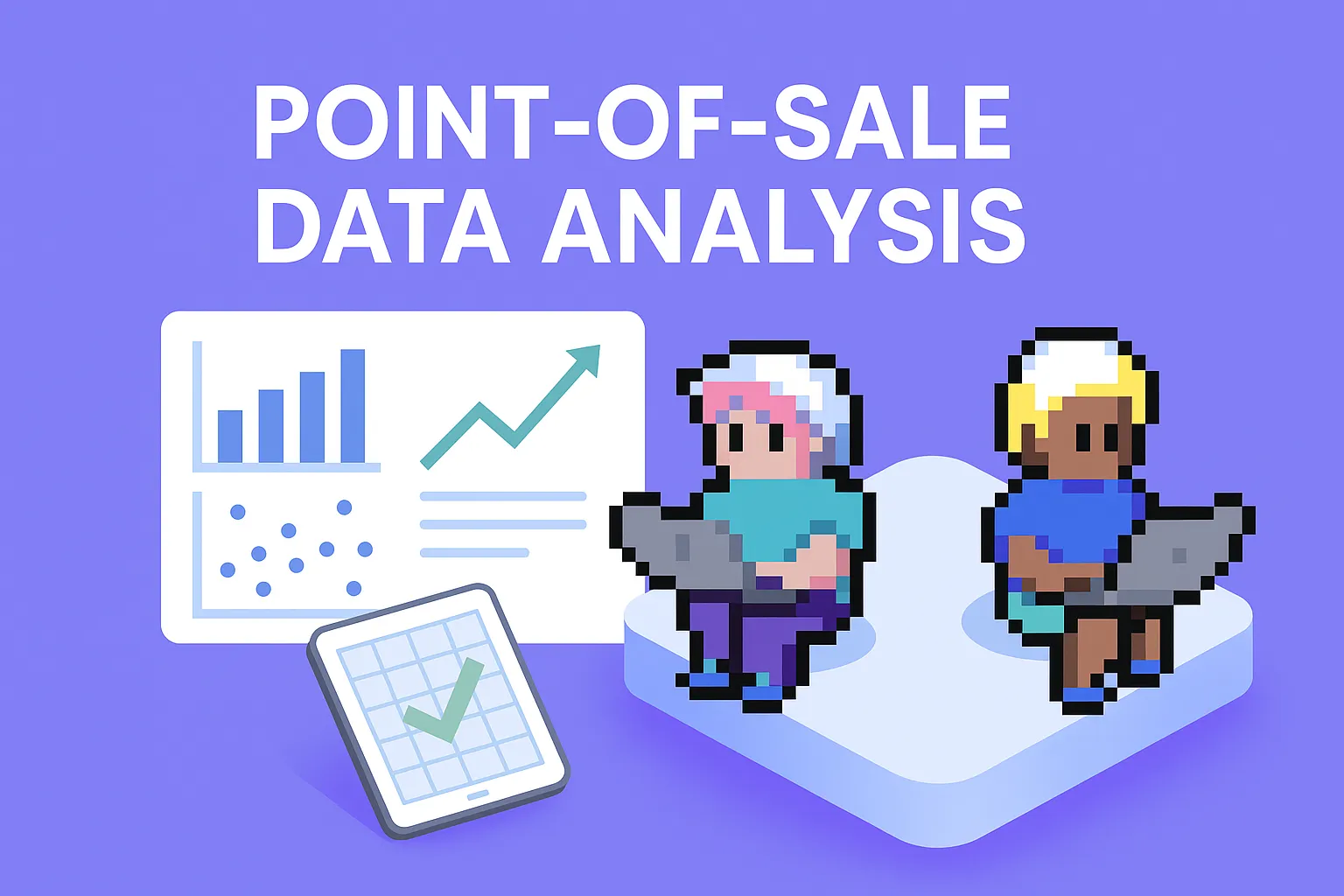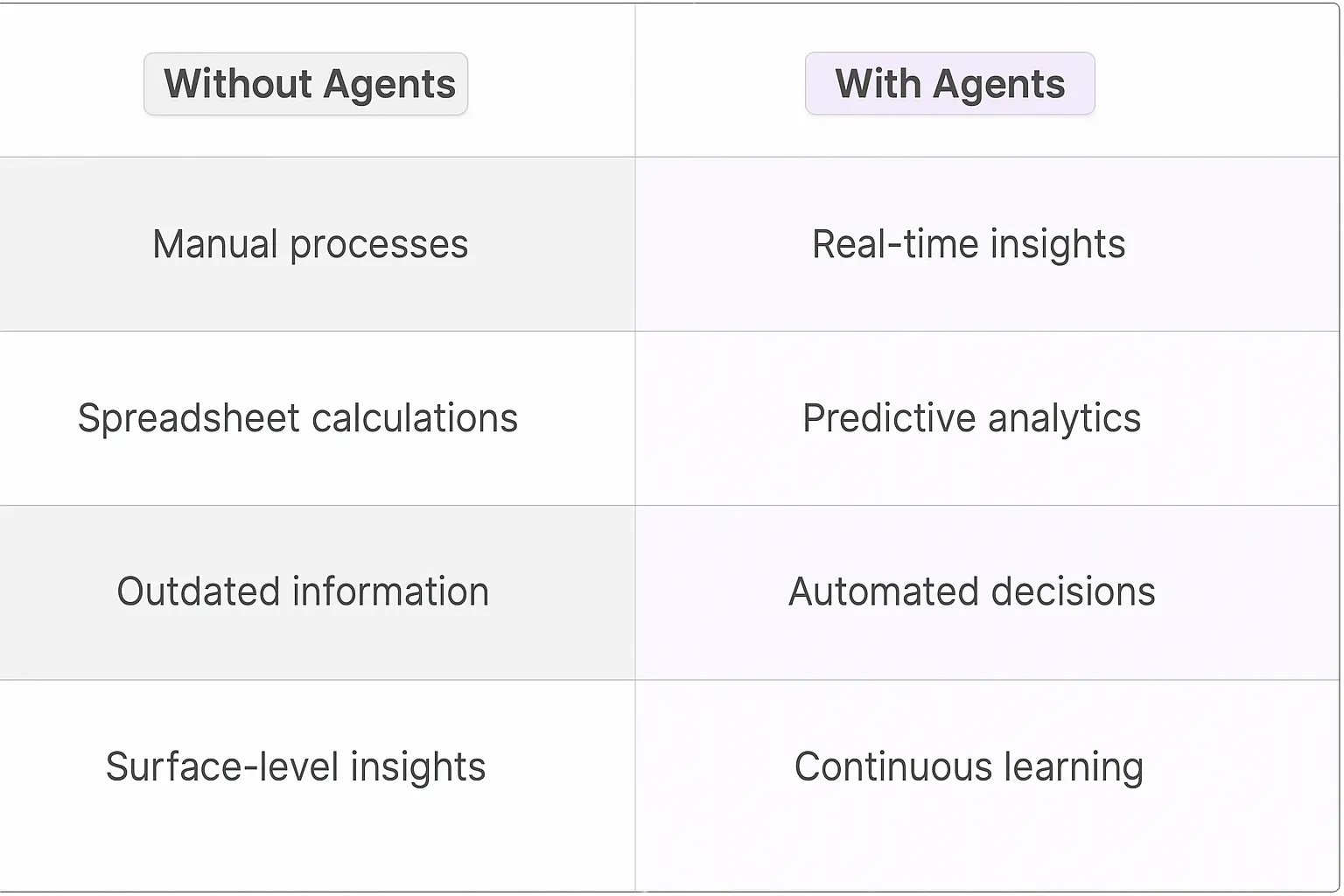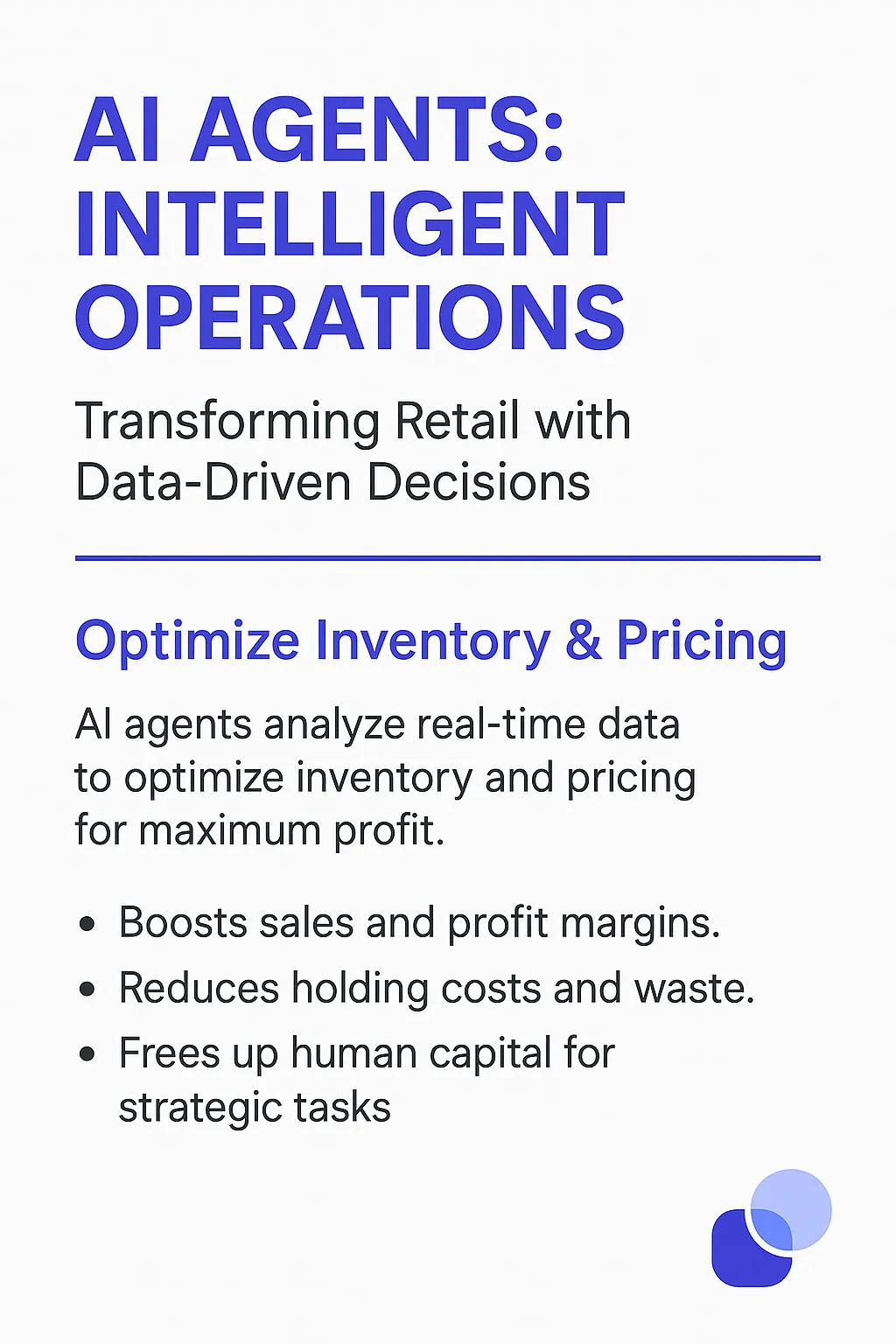Point-of-Sale Data Analysis AI Agents
Unveiling the Power of POS Data Analysis
Point-of-Sale (POS) Data Analysis is the process of examining and interpreting the wealth of information generated at the point of purchase in retail environments. It's like having a microscope that lets you see the DNA of your business transactions. This analysis covers everything from individual product sales and customer behavior to broader trends in purchasing patterns and inventory turnover. In essence, it's about turning the firehose of raw transaction data into a precise stream of actionable insights.
The key features of POS Data Analysis are what make it a powerhouse for retail strategy:1. Transaction Tracking: It captures every sale, return, and exchange, giving you a granular view of what's moving and what's not.2. Customer Insights: By analyzing purchase history, it helps build detailed customer profiles, revealing preferences and buying habits.3. Inventory Management: It provides real-time stock levels and helps predict future inventory needs based on sales trends.4. Sales Performance Metrics: It offers deep dives into product performance, helping identify top sellers and underperformers.5. Trend Identification: By spotting patterns over time, it helps predict future sales trends and seasonal fluctuations.6. Multi-channel Integration: It can combine data from various sales channels, giving a holistic view of the business.7. Customizable Reporting: It allows for tailored reports that focus on the metrics that matter most to your specific business.These features, when powered by AI, become even more potent, offering predictive capabilities and automated reporting that can revolutionize retail operations.

Benefits of AI Agents for Point-of-Sale Data Analysis
What would have been used before AI Agents?
Before AI agents entered the scene, point-of-sale data analysis was a manual slog. Businesses relied on teams of analysts armed with spreadsheets and basic visualization tools. They'd spend hours - sometimes days - crunching numbers, trying to extract meaningful insights from mountains of transaction data. It was slow, error-prone, and often resulted in surface-level observations that barely scratched the potential of the data goldmine they were sitting on.
The process was reactive rather than proactive. By the time insights were gleaned, they were often outdated. Retailers struggled to keep up with rapidly changing consumer behaviors and market trends. The lag between data collection and actionable insights meant missed opportunities and slower adaptation to market shifts.
What are the benefits of AI Agents?
Enter AI agents for point-of-sale data analysis. These digital teammates are game-changers, transforming how businesses understand and leverage their sales data. Here's why they're causing such a stir:
1. Real-time insights: AI agents process data as it flows in, providing instant analysis. This means businesses can spot trends as they emerge, not weeks later. It's like having a team of analysts working 24/7, never sleeping, never taking a coffee break.
2. Pattern recognition at scale: These AI agents can sift through millions of transactions, identifying patterns that human analysts might miss. They're not just looking at obvious correlations; they're uncovering subtle relationships between variables that can lead to breakthrough insights.
3. Predictive analytics: By analyzing historical data and current trends, AI agents can forecast future sales patterns with uncanny accuracy. This isn't just guesswork; it's data-driven prediction that allows businesses to stay ahead of the curve.
4. Personalization engine: AI agents can segment customers based on their purchasing behavior, enabling hyper-personalized marketing strategies. This level of granularity was simply not feasible with traditional methods.
5. Anomaly detection: These digital teammates excel at spotting outliers in data. Whether it's identifying potential fraud or highlighting unexpectedly successful products, they bring attention to what matters most.
6. Automated reporting: Say goodbye to manually compiled weekly reports. AI agents can generate comprehensive, insightful reports automatically, freeing up human resources for more strategic tasks.
7. Continuous learning: Unlike static analysis tools, AI agents improve over time. They learn from new data, refining their models and predictions, becoming more accurate and valuable with each passing day.
The introduction of AI agents to point-of-sale data analysis isn't just an incremental improvement - it's a quantum leap. We're moving from a world of reactive decision-making to one of proactive strategy formulation. Businesses that harness this power will find themselves with a significant competitive edge, able to pivot faster, understand their customers deeper, and optimize their operations in ways previously unimaginable.
This is the kind of technology that doesn't just improve existing processes; it fundamentally reshapes how businesses operate and compete. It's a prime example of how AI is not just augmenting human capabilities, but opening up entirely new possibilities. The businesses that recognize and capitalize on this shift early will be the ones writing the success stories of tomorrow.

Potential Use Cases of AI Agents with Point-of-Sale Data Analysis
Processes
Point-of-sale (POS) data is a goldmine for retail businesses, but extracting actionable insights can be a complex and time-consuming process. AI agents are poised to transform this landscape, turning raw data into strategic advantages. These digital teammates can continuously analyze transaction patterns, customer behaviors, and inventory movements, providing real-time insights that human analysts might miss.
One key process where AI agents excel is in demand forecasting. By ingesting historical POS data, current market trends, and even external factors like weather patterns or local events, these agents can predict future sales with uncanny accuracy. This allows businesses to optimize inventory levels, reducing both stockouts and overstock situations.
Another critical process is customer segmentation. AI agents can sift through vast amounts of transaction data to identify distinct customer groups based on purchasing habits, preferences, and lifetime value. This granular segmentation enables hyper-targeted marketing campaigns and personalized customer experiences that drive loyalty and increase average order values.
Tasks
On a more granular level, AI agents can tackle specific tasks that traditionally eat up hours of human analysts' time. For instance, they can automatically flag anomalies in sales data, spotting potential issues like theft, data entry errors, or sudden shifts in consumer behavior that warrant immediate attention.
These digital teammates can also generate comprehensive reports on key performance indicators (KPIs) without human intervention. Imagine waking up to a detailed analysis of yesterday's sales, complete with comparisons to historical data, breakdowns by product category, and recommendations for inventory adjustments – all generated overnight by your AI agent.
Moreover, AI agents can continuously monitor pricing strategies across product lines. By analyzing sales data alongside competitor pricing information, these agents can suggest dynamic pricing adjustments to maximize profitability while maintaining competitiveness.
In the world of retail, where margins are often razor-thin and competition is fierce, these AI-powered capabilities aren't just nice-to-haves – they're becoming essential tools for survival and growth. The businesses that embrace these digital teammates will find themselves with a significant edge, able to make faster, more informed decisions that directly impact their bottom line.
As we move forward, we'll likely see AI agents evolve from mere analytical tools to proactive strategic advisors. They'll not only crunch numbers but also propose innovative sales strategies, predict emerging market trends, and even assist in product development based on deep analysis of customer preferences and purchasing patterns.
The future of retail belongs to those who can harness the power of their POS data most effectively. AI agents are the key to unlocking this potential, turning every transaction into a strategic asset that drives business growth.

Industry Use Cases: Point-of-Sale Data Analysis AI Agents
The versatility of AI agents in point-of-sale data analysis makes them valuable across various industries. Let's dive into some meaty, industry-specific use cases that show how AI can level up workflows and processes.
These digital teammates aren't just fancy calculators - they're like having a team of data scientists working 24/7, uncovering insights you didn't even know existed in your POS data. They're the secret weapon that can turn your mountain of transactions into a goldmine of actionable intelligence.
From retail to restaurants, e-commerce to entertainment venues, AI agents are transforming how businesses interpret and leverage their point-of-sale data. They're not just crunching numbers; they're identifying trends, predicting customer behavior, and even suggesting inventory adjustments in real-time.
But here's the kicker - these AI agents aren't replacing humans. Instead, they're augmenting human intelligence, freeing up your team to focus on high-level strategy and creative problem-solving. It's like giving your business a cognitive upgrade, enabling you to make smarter, data-driven decisions at lightning speed.
So, buckle up as we explore how different industries are leveraging these AI powerhouses to turn their point-of-sale data into a competitive edge. From optimizing pricing strategies to personalizing customer experiences, these use cases will show you the transformative potential of AI in POS data analysis.
Retail Revolution: Point-of-Sale Data Analysis AI Agents in Fashion
The fashion industry is notoriously fickle, with trends changing faster than you can say "last season's lookbook." But what if we could predict these shifts with uncanny accuracy? Enter point-of-sale (POS) data analysis AI agents, the digital teammates that are about to turn the retail game on its head.
Let's break it down. Every time a customer swipes their card or taps their phone at a fashion retailer, they're not just making a purchase - they're contributing to a vast ocean of data. Traditionally, making sense of this data has been like trying to read tea leaves in a hurricane. But POS data analysis AI agents are changing the game.
These AI agents can crunch through millions of transactions in real-time, identifying patterns that would take human analysts years to spot. They're not just looking at what's selling; they're analyzing when it's selling, who's buying it, and even what other items are frequently purchased alongside it.
For a fashion retailer, this is gold dust. Imagine being able to predict with startling accuracy which colors will be hot next season, or which styles are about to fall out of favor. These AI agents can do just that, enabling retailers to adjust their inventory and marketing strategies on the fly.
But it goes deeper. These AI agents can also identify micro-trends specific to individual stores or regions. A certain style might be flying off the shelves in Miami but gathering dust in Seattle. With this granular insight, retailers can tailor their stock and promotions to local tastes, maximizing sales and minimizing waste.
The real kicker? These AI agents learn and improve over time. As they process more data, their predictions become more accurate. They start to factor in external variables like weather patterns, local events, or even social media trends, creating a holistic view of what drives fashion purchases.
For fashion retailers, this isn't just about boosting sales (although that's certainly a nice perk). It's about sustainability. By more accurately predicting demand forecasting, retailers can reduce overproduction, cutting down on the industry's notorious waste problem. It's a win for the bottom line and the planet.
The fashion industry has always been about staying ahead of the curve. With POS data analysis AI agents, retailers aren't just predicting the future - they're shaping it. Welcome to the new frontier of fashion retail, where data is the new black, and AI is the must-have accessory of the season. These agents excel at customer segmentation, enabling hyper-personalized experiences that drive loyalty and sales.
Hospitality Hacked: Point-of-Sale Data Analysis AI Agents in Hotels
Let's talk about the hotel industry - a sector ripe for disruption and one where point-of-sale (POS) data analysis AI agents are about to check in for an extended stay.
Hotels are data goldmines. Every guest interaction, from booking a room to ordering room service, generates valuable information. But until now, most of this data has been sitting idle, like an untouched minibar.
POS data analysis AI agents are the key to unlocking this treasure trove. These digital teammates can process vast amounts of transaction data in real-time, uncovering patterns and insights that would make even the most seasoned hotelier's head spin.
Think about it. These AI agents can analyze which room types are most popular during specific seasons, which amenities drive the highest revenue, and even predict occupancy rates with scary accuracy. But that's just the beginning.
The real magic happens when these AI agents start cross-referencing POS data with other sources. They can correlate room bookings with local events, weather patterns, or even flight schedules. Suddenly, hotels can anticipate demand spikes before they happen, adjusting pricing and staffing accordingly.
But here's where it gets really interesting. These AI agents can personalize the guest experience in ways we've never seen before. By analyzing a guest's past purchases and preferences, hotels can tailor their offerings to each individual. Like a guest who always orders a gin and tonic from the bar? How about a complimentary bottle of premium gin waiting in their room?
The implications for upselling are massive. These AI agents can identify the perfect moment to offer a spa treatment, a room upgrade, or a late checkout. It's not just about pushing more services; it's about offering the right service at the right time, enhancing the guest experience while boosting revenue.
And let's not forget about operational efficiency. By analyzing POS data from restaurants, bars, and other hotel services, these AI agents can optimize inventory management and staffing levels. No more overstocked bars or understaffed reception desks during peak hours.
The beauty of these AI agents is that they're constantly learning. As they process more data, their predictions and recommendations become more accurate. They start to pick up on subtle trends and correlations that even the most experienced hotel managers might miss.
For the hotel industry, this isn't just a nice-to-have. It's a game-changer. In a sector where margins are often tight and competition is fierce, the insights provided by these AI agents could be the difference between a fully booked hotel and a ghost town.
The hospitality industry has always been about providing a personalized, memorable experience. With POS data analysis AI agents, hotels are taking this to the next level, creating a stay that's tailored to each guest's preferences, often before the guest even realizes what they want. A skilled revenue manager can leverage these insights to maximize profitability across all hotel operations.
Welcome to the future of hospitality, where AI isn't just a tool - it's the concierge, the revenue manager, and the crystal ball all rolled into one. The hotels that embrace this technology won't just survive; they'll thrive in ways we're only beginning to imagine.
Considerations
Technical Challenges
Implementing a Point-of-Sale (POS) Data Analysis AI Agent isn't a walk in the park. It's more like navigating a complex maze while juggling flaming torches. The first hurdle? Data integration. POS systems are notoriously diverse, each with its own quirks and data formats. Your AI agent needs to be a polyglot, fluent in the language of every POS system out there.
Then there's the issue of real-time processing. In retail, yesterday's insights are about as useful as last season's fashion trends. Your AI needs to crunch numbers faster than a caffeinated day trader, delivering actionable insights before the next customer even reaches the checkout.
And let's not forget about scalability. A solution that works for a boutique won't cut it for a multinational chain. Your AI agent needs to scale seamlessly from handling a trickle of data to processing a tsunami of transactions without breaking a sweat.
Operational Challenges
On the operational front, things get even trickier. First up: the human factor. Retail staff aren't typically data scientists. Your AI agent needs to speak their language, delivering insights that are clear, actionable, and don't require a Ph.D. to understand.
Then there's the challenge of change management. Retailers are creatures of habit, and introducing an AI agent is like dropping a cat into a room full of pigeons. You need to convince everyone from the cashier to the CEO that this digital teammate isn't here to replace them, but to make their jobs easier and more effective.
Privacy and security are another minefield. Your AI agent will be handling sensitive customer data, and one slip-up could lead to a PR nightmare and legal headaches. You need Fort Knox-level security, but with the user-friendliness of a neighborhood lemonade stand.
Lastly, there's the ROI question. Retailers operate on razor-thin margins, and they'll want to see concrete results fast. Your AI agent needs to prove its worth not in months or years, but in weeks or even days. It's a tall order, but in the world of retail tech, it's innovate or evaporate.
The Future of Retail: AI-Driven Insights Reshaping the Industry
Point-of-Sale Data Analysis AI Agents are not just a tool; they're a paradigm shift in retail operations. They're turning the art of retail into a science, providing insights that were previously unimaginable. These digital teammates are enabling retailers to move from reactive to proactive strategies, anticipating customer needs and market trends before they even materialize.The impact of this technology extends far beyond just boosting sales. It's about creating a more efficient, sustainable, and customer-centric retail ecosystem. By optimizing inventory, reducing waste, and personalizing customer experiences, these AI agents are helping businesses not just survive, but thrive in an increasingly competitive landscape.However, the journey doesn't end here. As these AI agents continue to evolve, we can expect even more sophisticated capabilities. Imagine AI that can not only predict trends but also suggest new product lines or even autonomously manage entire aspects of retail operations.The retailers who embrace this technology now will be the ones writing the success stories of tomorrow. They'll be the ones setting the trends, not following them. These AI agents excel at predictive analytics and customer segmentation, enabling businesses to make data-driven decisions with unprecedented accuracy. In the end, Point-of-Sale Data Analysis AI Agents aren't just changing the game - they're rewriting the rules entirely. Welcome to the future of retail, where data isn't just king - it's the entire kingdom.













